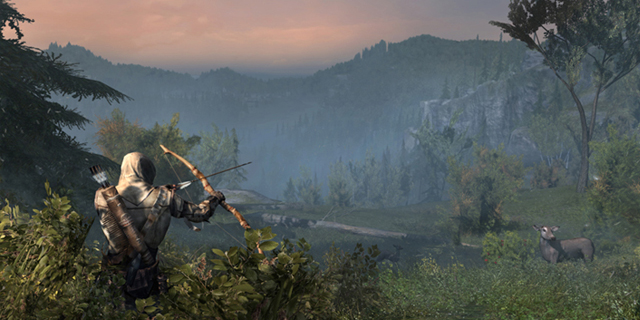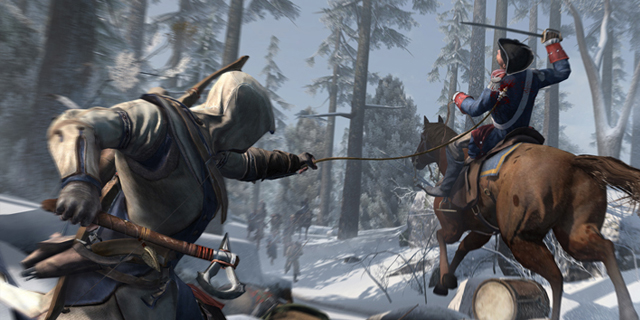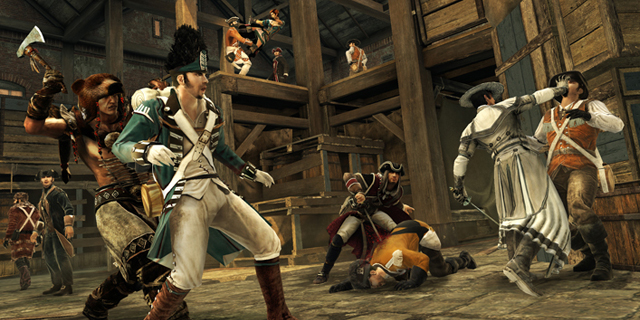
Assassin’s Creed is an odd series. The first was burdened with repetition, the second was absolutely wonderful, its two sequels (forming a trilogy in the middle of a series) added great things just as often as they added needless cruft; much as I enjoy tower defense, those sections of Revelations weren’t fun and felt tacked on. Brotherhood added the stellar band of junior assassins at your command, which was expanded in Revelations in Mediterranean Defense (which I’m still convinced could be carved out and sold solo on XBLA or Steam).
At the end of the day, though, I miss the loveable rogue we had in Ezio. Connor is interesting, but Ezio was just plain more fun, and his games took place in cities with more verticality which really allowed the parkour system to shine.
There are some arguments to be made that the first Assassin’s Creed game was the best in the series. I disagree with the sentiment, but one thing that was wonderful about it was that Altaïr felt like a real assassin. A typical assassination was comprised of eavesdropping on a target’s conversation, procuring a map of the estate where the target would be, interrogating an off-duty guard to learn the patrol schedule and then using all of that information to sneak in, take out your target and then fight your way out. It felt organic, it was rewarding to work out a plan and it was great to not be led down the critical path like a dullard. Unfortunately, every game since the original has done just that: shoved the planning and scheming into cutscenes, and setting up the cornerstone assassination missions to play out one way and only one way.

After Altaïr’s outing, Ubisoft took notice of people’s complaints and started adding optional activities to each subsequent entry. By the end of Brotherhood, I owned a controlling stake in the entirety of Rome. By the end of Revelations, I owned the majority of Constantinople, and my band of assassins had the Mediterranean squarely under Assassin control. And all the while, I was buying pieces of art to decorate my house. After a little while, it’s just too much. I don’t want to herd pigs, hunt deer or send out caravans to make money to let me buy more decorations for my homestead. I want to play the storyline, take part in a faux-historical adventure and marvel at my handiwork when I take on 12 redcoats simultaneously and come away from the melee unscathed.
Thankfully, I can do all of those things, but along the way the game complains at me that I haven’t been hunting lately. And when I get to the assassination, we’re right back to “start here, do this, jump here, stab that guy, have a scripted fight.” I legitimately miss the freedom afforded to the player in the first game. I don’t miss the tedium, but I miss being treated like a grown-up. If I choose not to figure out the guard schedule, then let me get caught. Don’t script a cutscene where I’m flat-out told the guard schedule, and then throw up tooltips reminding me to stay hidden. I’m playing an assassin for pity’s sake. If I can’t figure out that I should stay hidden, then I should be playing a different game.

Because of these design decisions, Assassin’s Creed III shines in the Templar forts just like previous games shone in Borgia Towers and Templar Dens. I am finally afforded the chance to take stock of a situation, decide on a plan of attack and succeed or fail on my own merits. I can go stealthy by laying traps and silently taking out guards one by one, or I can make sure my pistol is loaded and go in guns blazing for a big fight. Whatever I decide to do might fail, but if it fails I have to determine what I planned out wrong instead of just “did I take the path the developer laid out?” or “how can I avoid such a large combat?” instead of “how can I survive such a large combat?”
I feel like I’ve been complaining a lot, and the reason for it is because I’m invested enough in the story and gameplay here that I constantly wish it was just a little bit better. The story, both the past and the present iterations, is interesting and fun to experience, so when the whole thing catapults me back into “you’re playing a game, man!” by yelling at me to hire artisans at my homestead, it’s frustrating. If the homestead was more interesting it’d be one thing, but I’m being drawn out of the interesting story to be reminded of boring side bits.
So what else does Assassin’s Creed III do well? Naval combat, for one, is spectacular. I’ve got a game of Master and Commander for free in AC3, and I love it. The ship always feels like you’re only just hanging on to control, the wood splinters are believable and sickening as you’re pelted with cannonballs from enemy ships, and the camera shake really lends some weight to the hits. If Ubisoft failed with Den Defense (and they did), then they’ve more than made up for it with naval combat here.
Multiplayer also makes a return. In every other iteration I’ve thought the concept was interesting but left it early because I’m just not very good at it. Here, though, I’ve found my game mode. Wolf Pack is fun, interesting, and cooperative. You and three comrades team up to take down increasingly alert and paranoid targets. Each kill extends the time on the clock, but only by working together can you add enough time to reach and take down your final target. It’s a joy to play and a great twist on the multiplayer that Assassin’s Creed: Brotherhood borrowed from The Ship three games ago.
I enjoyed Connor’s story immensely, even if I find him less engaging than Ezio and his plot more hand-holding than Altaïr’s. It’s a fun ride with ups and downs, but I was expecting a more streamlined experience. It’s true that I can’t craft bombs and send my junior assassins out on missions, but instead of trimming down to the core experience and making sure that it was phenomenal, Ubisoft has just taken out elements and replaced them with new ones. Hopefully, the eventual Assassin’s Creed IV will realize what made the first game great and bring some of that back. Player freedom is a powerful thing, and it’s a shame that Ubisoft misunderstood player complaints about the first game’s repetitive nature as all of us wishing for a more guided experience.
Pros: Interesting narrative, great new multiplayer mode, naval combat and Templar forts are both great
Cons: Homestead is boring, Connor is not as likeable as Ezio, lack of verticality in environments



















